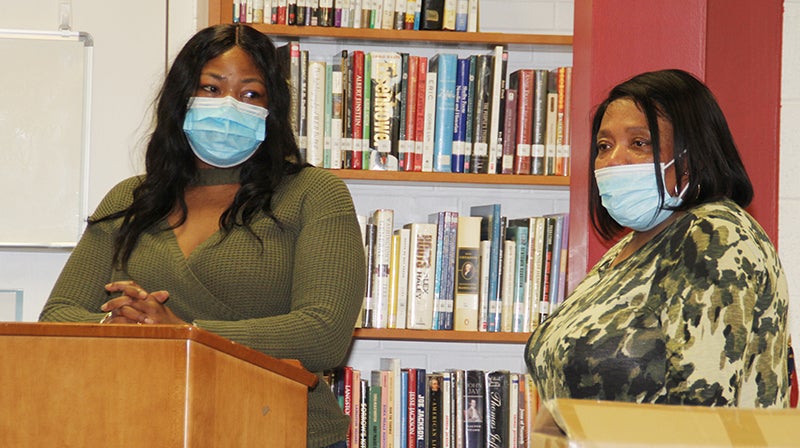Board tweaks condemnation ordinance
Published 10:38 am Wednesday, June 15, 2011
GATESVILLE – The Gates County Board of Commissioners have moved one step closer in adopting a condemnation ordinance for unoccupied structures in Gates County that pose a safety or health hazard.
At their meeting here earlier this month, Gates County Planner Morgan Jethro brought the ordinance back before the board. She noted the amended changes, as dictated by the commissioners, from its initial introduction before the board at their May meeting.
The board, apparently studying the amended ordinance prior to the June 1 meeting, made slight adjustments to the wording before launching into a discussion over one key element of the document – allowing citizens to make anonymous complaints concerning unoccupied structures that may pose a danger to the health, safety and welfare of the residents of Gates County.
Board Chairman Graham Twine didn’t like the idea of allowing anonymous complaints.
“If you have a complaint, then call and put your name on it,” Twine said.
“That was one of the things we talked about at our previous meeting,” Commissioner Henry Jordan said. “If someone does call and doesn’t leave their name, the complaint still has to be verified (prior to action being taken).”
“I’m still not sold on that,” Twine stated.
“If there is something out there that may be a hazard, we can check it out,” Jordan replied.
Twine mentioned that running down complaints that may be unfounded – “a feud between neighbors with one using this to get back at the other,” he said – would be costly to the county.
“I see your point, but if there’s something there (posing a hazard) then it’s worth our time and effort,” Jordan said.
In defining the word anonymous, Commissioner Johnny Hora said a complaint taken by telephone was easy to figure out the identity of the caller, but that becomes more difficult if the complaint is received by mail (an unsigned letter) and there is no return address of the writer.
“If someone wants to remain anonymous, there’s a reason why they want to do that,” Jordan said. “They should be allowed to do that. The complaint still has to be verified by the (building) inspector. The inspector can do so at his convenience. If it takes six months, then he has the privilege to do that. The county has the option to check and verify if the complaint has merit.”
“If you don’t verify it and a call comes in a second time and the person tells you that this is the Governor of the State of North Carolina, I called you last week (and you’ve done nothing about the complaint), what will we do then,” Hora asked.
Gates County DSS Director Colleen Turner said her department receives complaints all the time concerning suspected child or elder abuse and her department is required by law to check out those complaints.
“We encourage reporters to identify themselves and we provide safeguards to those making reports that their identity will not be revealed to the party that the report is being made against so there’s no threat of retaliation,” she said. “What we find is if people are not able to be reassured that their identity will be protected, then they won’t report. In our world that means potentially vulnerable individuals that are not looked in to.”
Turner also mentioned that DSS has a policy regarding malicious reporting, saying a person filing an unfounded report is subject to charges by law enforcement officials.
“We can’t do that with this ordinance the way it’s written,” noted Twine.
“If you decide to receive anonymous reports, I would suggest that you encourage people to identify themselves so that they be contacted for additional information in the future if needed,” Turner stated. “Ensure them their identity will be protected.
“I like that idea,” Twine said.
“The intent of what we’re trying to accomplish is to get these potential hazards addressed,” Commissioner Jack Owens said. “Ideally, it would be great if those making such complaints would put their name on it, but ultimately we’re really not concerned about tracking down that anonymous person. Even if we knew who that caller is, we’re not going to divulge that information.
“I really don’t like the word complaint…if I see one (potential hazardous structure) and I call in and I remain anonymous, I’m really not making a complaint, I’m just making you aware,” Owens added. “I like allowing anonymous, it will drive the calls and that’s what we really want.”
Again, Jordan stressed that all complaints, anonymous or identified, are required to be, by the wording of the proposed ordinance, “verified by staff before they are put on a list for action to be taken.”
“The list (for action) is made up of staff observations,” Jordan said.
“I want to make sure that if we do receive a second call, I want us to respond positively that, yes, we have checked this property,” Hora noted. “That’s the most important thing….it might take a week or so to check, but we took the complaint seriously and we did act.”
When asked about anonymous phone calls to his office, Gates County Sheriff Ed Webb said they are received on a regular basis.
“We usually try to verify (the calls), but there are times when the calls are vindictive in nature, someone has a grudge against some other person,” Webb said.
Pitt Godwin, who serves as legal counsel to the board of commissioners, said he had closely studied the proposed ordinance and said it was “fine the way it is written.”
“You have the verification process in place; you’re covered there,” Godwin said. “You will have some that want to remain anonymous because it’s a family situation or a next door neighbor situation.”
Owens motioned for the approval of changes to the ordinance. Vice-Chairman Kenneth Jernigan offered a second. It was approved by a 5-0 vote and will not take affect until a public hearing is held.



